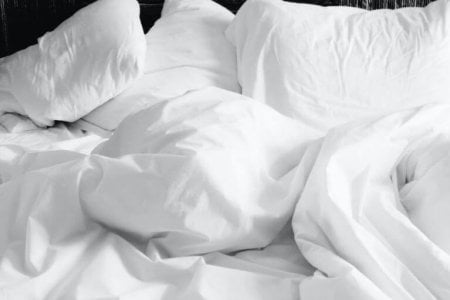Discover the secret to a healthy life
- Replies 9
As we age, our bodies tend to be much less forgiving when it comes to the ill effects of sleep deprivation.
And while it's true that one poor night's rest won't drastically affect your physical health long-term, chronically inadequate sleep is linked to several serious health issues.
And it's not just our physical health that's impacted in the long term. Studies have found that not getting adequate sleep, or not getting restorative sleep, can also heighten mental health concerns, such as depression or anxiety.
Furthermore, not sleeping enough or sleeping poorly has been linked to memory loss, poorer concentration, decreased motor skills, and even an increased risk of a car accident.
For adults between the ages of 18 to 64, the recommended amount of sleep per night is 7 to 9 hours. While adults over 65 need about 6 hours of sleep (at the minimum) to feel refreshed.
However, experts suggest that only getting six hours of sleep regularly can have serious consequences for your health. You can read more about that here.
Yet, according to the Centres for Disease Control and Prevention (CDC), 28.4 per cent of working adults slept 6 or fewer hours per night in 2009 – that number jumped to 32.6 per cent by 2017/2018.
So, while getting a good night’s sleep is linked to improved mood, and greater concentration, it can also help reduce the risk of serious health problems such as diabetes, high blood pressure, and heart disease. Better sleep can also mean a stronger immune system, thereby making you less vulnerable to illnesses.
When you don’t get enough sleep, your body produces ghrelin, a hormone that boosts your appetite, this can make it harder for you to lose weight. Your body also reduces the production of leptin, which is a hormone that tells you when you’re full, which could lead you to crave more junk food.
If you want to improve your sleeping habits, we’ve got some tips we’d like to share!
Tip #1: Comfort is key.
Create a comfortable sleep environment by making sure your bedroom is dark and quiet.
Tip #2: Adjust the temperature.
The best bedroom temperature to sleep in is approximately 18.3°C. Of course, this can vary depending on your preference, so feel free to adjust accordingly.
Tip #3: Curate a routine.
Set a bedtime routine to signal your body that it’s time to wind down. If you’re having trouble coming up with a routine, we have got you covered.
Tip #4: Beds are for sleeping.
Use your bedroom for relaxation only, if possible.
Tip #5: Stay active as much as possible.
During the day, keeping your body active will help you burn off excess energy. You don’t have to go to the gym to stay fit, you can just follow our tips here. However, consult with your doctor first before starting any new exercise regimen.
Tip #6: Be mindful of your body.
Sprinkle in a bit of self-care in your daily routine. Try to meditate or take a warm bath to relax your body and mind.
Tip #7: Melatonin might help.
Melatonin is commonly used as a supplement for adults to help improve sleep. However, it is not for everyone. If you’re interested in taking melatonin supplements, it’s best to consult your GP first to be aware of the correct dosage and possible side effects (and to ensure it won’t negatively interact with any existing medication).
Tip #8: Stay away from blue light.
Blue light commonly comes from your phone or TV screen and can contribute to sleep difficulties. Therefore, avoid using your phone or watching TV at night while in bed. Putting down your devices an hour or two before bed is enough to improve your sleep quality.
Tip #9: Think twice about chocolate or coffee at night.
Coffee and chocolate have caffeine, a stimulant that can contribute to sleep deprivation.
Tip #10: Consult your doctor.
If you suffer from sleep-related problems, such as apnoea, sleep paralysis, or teeth grinding, visit your doctor so they can suggest long-term solutions.
 What are your thoughts on this, members? Let us know in the comments! And remember, it's never too late to start developing healthy sleep habits!
What are your thoughts on this, members? Let us know in the comments! And remember, it's never too late to start developing healthy sleep habits!
And while it's true that one poor night's rest won't drastically affect your physical health long-term, chronically inadequate sleep is linked to several serious health issues.
And it's not just our physical health that's impacted in the long term. Studies have found that not getting adequate sleep, or not getting restorative sleep, can also heighten mental health concerns, such as depression or anxiety.
Furthermore, not sleeping enough or sleeping poorly has been linked to memory loss, poorer concentration, decreased motor skills, and even an increased risk of a car accident.
For adults between the ages of 18 to 64, the recommended amount of sleep per night is 7 to 9 hours. While adults over 65 need about 6 hours of sleep (at the minimum) to feel refreshed.
However, experts suggest that only getting six hours of sleep regularly can have serious consequences for your health. You can read more about that here.
Yet, according to the Centres for Disease Control and Prevention (CDC), 28.4 per cent of working adults slept 6 or fewer hours per night in 2009 – that number jumped to 32.6 per cent by 2017/2018.
So, while getting a good night’s sleep is linked to improved mood, and greater concentration, it can also help reduce the risk of serious health problems such as diabetes, high blood pressure, and heart disease. Better sleep can also mean a stronger immune system, thereby making you less vulnerable to illnesses.
When you don’t get enough sleep, your body produces ghrelin, a hormone that boosts your appetite, this can make it harder for you to lose weight. Your body also reduces the production of leptin, which is a hormone that tells you when you’re full, which could lead you to crave more junk food.
If you want to improve your sleeping habits, we’ve got some tips we’d like to share!
Tip #1: Comfort is key.
Create a comfortable sleep environment by making sure your bedroom is dark and quiet.
Tip #2: Adjust the temperature.
The best bedroom temperature to sleep in is approximately 18.3°C. Of course, this can vary depending on your preference, so feel free to adjust accordingly.
Tip #3: Curate a routine.
Set a bedtime routine to signal your body that it’s time to wind down. If you’re having trouble coming up with a routine, we have got you covered.
Tip #4: Beds are for sleeping.
Use your bedroom for relaxation only, if possible.
Tip #5: Stay active as much as possible.
During the day, keeping your body active will help you burn off excess energy. You don’t have to go to the gym to stay fit, you can just follow our tips here. However, consult with your doctor first before starting any new exercise regimen.
Tip #6: Be mindful of your body.
Sprinkle in a bit of self-care in your daily routine. Try to meditate or take a warm bath to relax your body and mind.
Tip #7: Melatonin might help.
Melatonin is commonly used as a supplement for adults to help improve sleep. However, it is not for everyone. If you’re interested in taking melatonin supplements, it’s best to consult your GP first to be aware of the correct dosage and possible side effects (and to ensure it won’t negatively interact with any existing medication).
Tip #8: Stay away from blue light.
Blue light commonly comes from your phone or TV screen and can contribute to sleep difficulties. Therefore, avoid using your phone or watching TV at night while in bed. Putting down your devices an hour or two before bed is enough to improve your sleep quality.
Tip #9: Think twice about chocolate or coffee at night.
Coffee and chocolate have caffeine, a stimulant that can contribute to sleep deprivation.
Tip #10: Consult your doctor.
If you suffer from sleep-related problems, such as apnoea, sleep paralysis, or teeth grinding, visit your doctor so they can suggest long-term solutions.
Key Takeaways
- Not getting enough sleep can increase the risk for serious health problems like diabetes, high blood pressure, and heart disease.
- Adults between 18 and 64 need 7 to 9 hours of sleep per night. While 65 and over need a minimum 6 hours of sleep (at the minimum) to feel refreshed.
- Getting adequate sleep can help reduce stress and improve overall well-being.
- There are various tips, such as exercising and avoiding coffee late in the day, to help with getting better sleep.









